'It is great here in Scotland but our soul is at home in Ukraine'
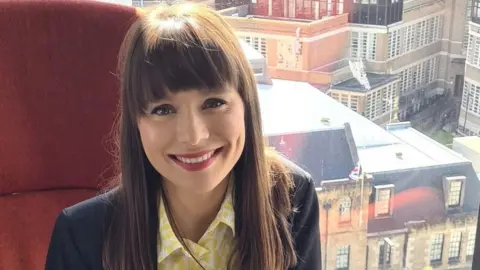 Maryna Naumenko
Maryna Naumenko Scotland has given a home to more than 20,000 Ukrainian refugees fleeing the conflict in their homeland. What are their experiences of life in a new country?
Maryna Naumenko, 32, moved to Glasgow with her mother, Liudmyla, and her 17-month-old daughter.
She used to work in the Ukrainian parliament and met her host Aileen when she organised an education centre for the parliament.
"We are lucky because they are really great, they really support us a lot and give us freedom," she said.
She has been volunteering as a translator and has worked for both the Association of Ukrainians in Great Britain and Police Scotland.
She plans to stay with her host family for another six months.
"We hope that we will win this war and we will be able to come home.
"We want to go home because part of my family - my husband, my father - they are in Ukraine, in Kyiv.
"It is great here but we feel like our soul, part of our family, is at home."
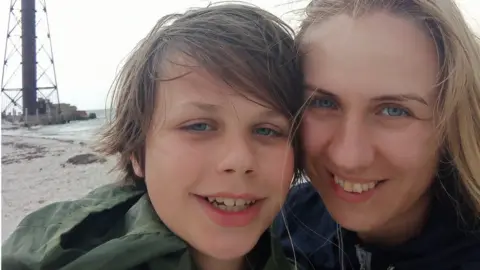 Olena Bolotova
Olena BolotovaOlena Bolotova, 35, and her 13-year-old son, Yaroslav, have been living in a Glasgow hotel after they fled their home in Kharkiv.
She said she was "very glad" to stay in "a beautiful city with an ancient history" - but that longer-term housing was a concern.
Alongside other Ukrainian refugees, she has been waiting for the council to find them permanent accommodation.
"It's a problem to find it by ourselves because in Scotland there are lots of rules," she said.
"It's not easy for Ukrainians to rent apartments here."
Olena said it was not possible to meet the guarantees which were sought by landlords, or to find the money for the first month's payment in advance.
She was a university lecturer in Ukraine, but has not been able to secure a job in Scotland. She said this had been an "interesting experience" because the process was so much slower than it would be in Ukraine.
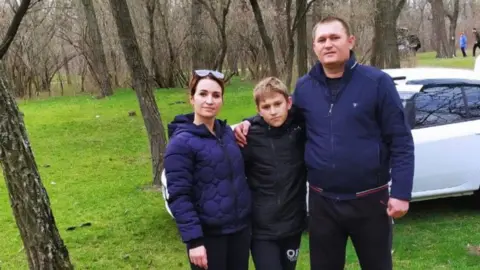 Sapiha family
Sapiha familyRuslan Sapiha, 35, has been living in Montrose with his wife Anna and their 12-year-old son, Kiril, after fleeing Melitopol, in south-eastern Ukraine.
Since they arrived in Scotland two months ago they have been staying with Fr Gary Clink, a minister in the Scottish Episcopal Church.
Ruslan said one of the biggest struggles had been the language barrier.
He worked as a welder in Ukraine and was able to get an interview with a welding company in Scotland, where he was able to demonstrate his skills.
But the organisation said he was not suitable for the job because the processes had to be explained in a lot of technical detail.
"What we've found is that although the council is supportive in giving people English, it's a one-hour lesson per week," said Fr Clink.
"You're not going to learn English in one hour. There needs to be a more intensive, immersive English course for people because without it, they're not going to be able to find jobs."
His son Kiril, however, was able to meet some new people before the start of the school term when Montrose football club gave him a free placement on its summer programme.
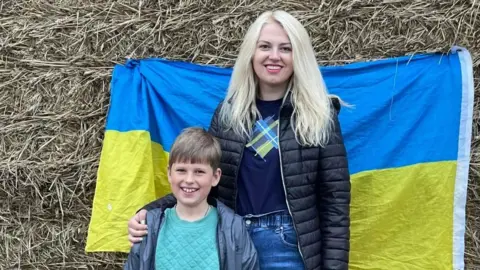 Olha Maksymiak
Olha MaksymiakOlha Maksymiak and her eight-year-old son Matvii came to Glasgow through the Ukraine Family Scheme.
She moved in with her sister, who has lived in Scotland for two years.
When she arrived in April, Ms Maksymiak said she found change in environment "very difficult".
"The first two months it was very stressful because it is all different from Ukraine, the system is different. You really don't know anything."
She said she was at the job centre for three hours the first time she visited it, because the staff were unsure how to help a Ukrainian refugee.
Olha now lives in a rented flat and has part-time job with Positive Action in Housing, after volunteering with the organisation for several months.
She has also been volunteering with the Scottish Refugee Council, meeting Ukrainians when they arrive at the airport, and is attending language classes at the City of Glasgow College.
She believes that being busy has helped her - while also allowing her to help lots of other people.
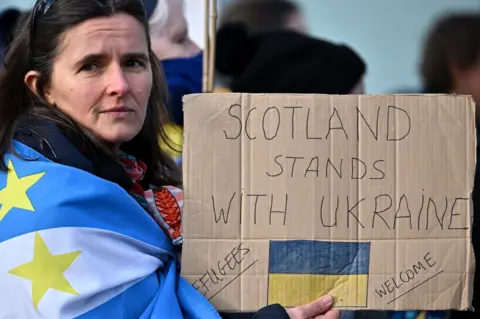 Getty Images
Getty ImagesThe Scottish government said it was providing sanctuary to more displaced people from Ukraine per head of population than any other part of the UK.
Neil Gray, the minister responsible for Ukrainian refugees, said more than three-quarters of those arrivals had been through its super sponsor scheme.
This scheme was paused in July and a review was carried out. Mr Gray is due to update Holyrood on the outcome later this month.
It announced last month that councils and registered social landlords will be able to apply for funding to bring properties into use and increase the supply of housing for Ukrainian refugees.
Up to £50m funding will be made available to refurbish properties through the Ukraine Longer Term Resettlement Fund.
These homes will be available for rent for up to three years, and some will then continue to be available as social housing.
"We don't want people spending any longer than necessary in temporary accommodation so we are working hard to find longer term, sustainable accommodation," said Mr Gray.
He added that Ukrainians would be able to access the full range of employment support services.
